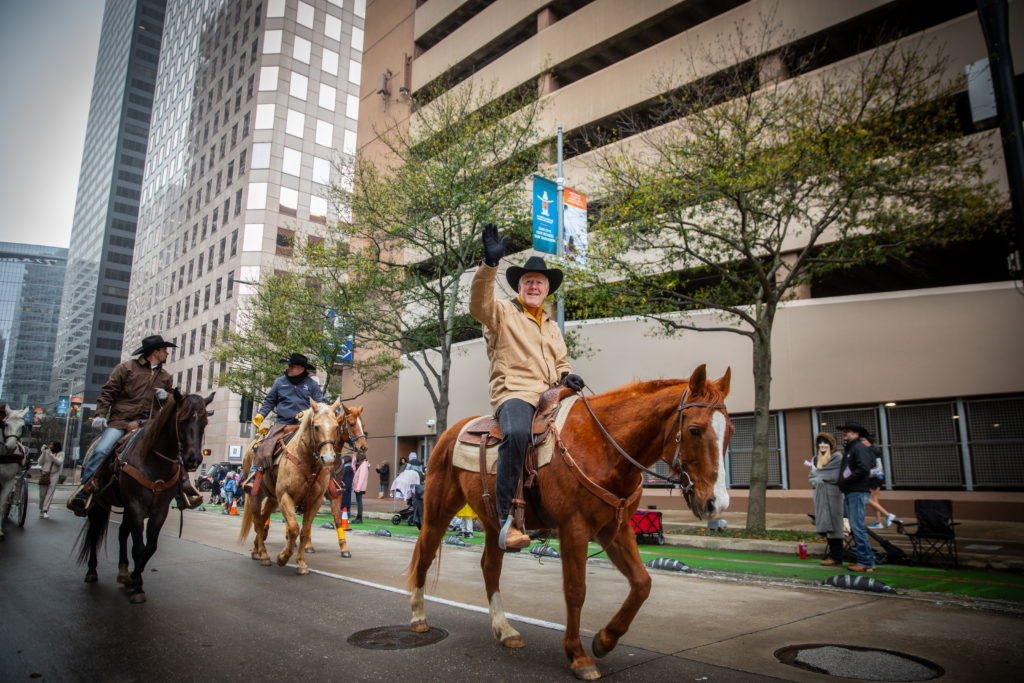Barrel racing, mutton bustin’, and bull riding are just some of the many events you can catch at one of Texas’ many rodeos. Recognized as the official sport of Texas, the history of rodeos in the Lone Star State dates much further back than its official proclamation by the Texas Legislature 25 years ago.
The Spanish conquistadors and Spanish-Mexican settlers that first arrived in Texas came with horses and cattle, kicking off our state’s rich and deep roots in the livestock industry. This new livestock led to the rise of ranchers and vaqueros, or cowboys. After the Civil War, the Southwest became the hub for cattle drives, large ranches, and range cowboys which are now pillars of the celebrated culture we know today.
While overseeing their pastures and driving cattle, these cowboys earned their spurs learning how to rope, ride, and wrangle livestock. These tricks of the trade traveled throughout Texas, and cowboys showcased these skills at local rodeos. The word “rodeo” came from a Spanish word meaning “round up,” an incredibly important activity where cattlemen gather their cattle to brand the new calves or move them to new pastures.
The first official rodeo took place in 1883 in Pecos, Texas. The Pecos Rodeo began as a competition for bragging rights between two cowboys duking it out to see who was the best in Texas. 140 years later, this renown rodeo continues to this day and attracts some serious competitors.
As more cowboys were crowned rodeo champions across the Lone Star State and the country, a unified effort to grab the reins and organize official competitions began. In 1936, the Professional Rodeo Cowboys Association established official rules to formalize the sport nationwide. By 1948, a determined group of women met in San Angelo, Texas with a mission to jump into the ring and create the Girls Rodeo Association, known now as the Women’s Professional Rodeo Association. The Association became the United States’ first women’s sports organization and still remains as the oldest women’s professional sports organization in the country. These visionaries branded themselves as trailblazers for women in the rodeo arena. Today, the Association is the only rodeo organization governed entirely by women and they work year-round to host competitive events across the nation.
No one deserves the grand champion belt buckle more than Mesquite, Texas. Since Mesquite hosts the most rodeos in our state, the Texas Legislature declared Mesquite the official rodeo capital of Texas in 1993. For over 60 years, the Mesquite Championship Rodeo has been quintessential to the rodeo experience with numerous events such as saddle bronc riding and team roping. To date this rodeo has been one of the most watched on television, with over 8 million households tuning into the events.
Following the trailheads south from Mesquite, the Houston Livestock Show and Rodeo always rounds up quite a crowd. Previously known as the Houston Fat Stock Show and Livestock Exposition, this rodeo began in 1931 at the Texas State Hotel as a way to grow the area’s cattle industry. More than 90 years later, this event moved to the Astrodome, and it now takes place at the neighboring NRG Stadium which was specially built for rodeo and the NFL. Cowboys and rodeo enthusiasts of all ages can enjoy the annual kick-off rodeo parade, trail rides, and concerts from a variety of music genres. The King of Country, George Strait, even debuted at the Houston Rodeo as a newcomer to the country music scene way back in 1983.
This year, I had the honor to saddle up on a horse named Cinch and ride in the Houston Rodeo kick-off parade, as I have frequently done in the past. Apart from living out my John Wayne dreams, it is a great chance to visit with Texans who support this great tradition that marks the start of the three week-long event thanks to the help from over 35,000 volunteers. The Houston Rodeo also awards over $14 million to the bright minds of student cowboys and cowgirls across our state, with $1.4 million going towards Texas 4-H scholarships.

Regardless if you’re competing in the stock show and rodeo events or just wanting to horse around, I hope you find a chance to wrangle up your friends and family and rope them into going to the local rodeo this year.